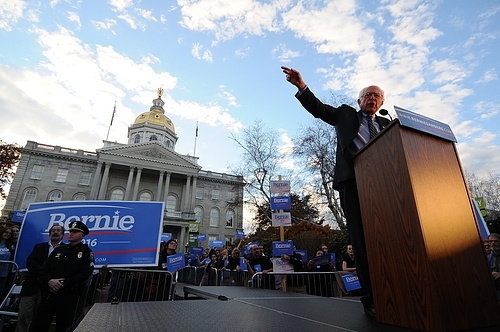“In the end, glorification of splendid underdogs is nothing other than the glorification of the splendid system that makes them so.”
— Theodor Adorno
Bernie Sanders lost the moment he became entranced by the prospect that he might win. What did he lose? His grip on political reality.
For most of his life Sanders has cultivated the role of political cynic, a professional outsider, a grand-standing critic of The System. Once he came in from the cold and converted from independent socialist to a Democrat (for life, according to his campaign manager Jeff Weaver) that hard-boiled cynicism—one’s tempted to call it realism—eroded away in the face of large crowds of adoring supporters, from Portland, Maine to Portland, Oregon. Is it possible that Sanders became intoxicated by the floridness of his own rhetoric?
The results from the New York primary perfectly distill the promise and the heartbreak of Sanders’s Quixotic campaign for the Democratic Party nomination. Coming off of his thrashing of Hillary Clinton in Wisconsin, Sanders enjoyed all of the momentum, media attention and energy heading toward the big stakes in New York. Even so, there was no chance that he could win the Empire State. The rules were against him, the demographics were against him, the System was against him. The polls showed him down by more than 10 points and barely twitched in the two weeks after Wisconsin. Yet a few days before the primary, Sanders confidently predicted victory. It was not a rational statement.
In the end, Hillary won New York by almost exactly the same margin that she defeated Barack Obama in 2008. Sanders might take some solace in the fact that he actually performed fractionally better than Obama. But he shouldn’t. In 2008, Obama, despite his loss in New York, was on his way to the Democratic nomination. Sanders, by contrast, is going nowhere at all, except in registering tens of thousands of new young voters as Democrats. Welcome to the machine, kids.
Of course, each time Bernie loses, under circumstances where the DNC establishment has fragrantly conspired against him, the senator raises freshets of more money online (at $27 a pop), thus encouraging him to continue his doomed crusade. Yet this steady stream of cash functions as a kind of fool’s gold. Bernie actually outspent Hillary in New York and the spending did him almost no good. At this rate, Bernie will have enough money in his tank to ride his caravan of self-aggrandizement all the way to Philly in July. But to what ends? And, more pragmatically, at what cost to the atmosphere?
I’m no fan of the Senator from Ben and Jerry’s, but, as the founding member of ABHoR (Anybody But Hillary Rodham), I stubbornly clung to my own fantasies about Sanders. Naively, I believed that if Bernie had fought to have the Iowa votes released, challenged the curious results in Nevada and Missouri and attacked the Super Delegate system he could have found a foothold, exposing how the DNC had rigged the process for Hillary. But that was delusional. In fact, there was almost certainly no pathway to victory for Sanders in the Democratic primaries. Perversely, Sanders’s team is now courting the anti-democratic Super Delegates in a last gasp attempt to neutralize Hillary’s insurmountable lead in awarded delegates. Why? More than 90 percent of Super Delegates have already pledged their votes to Clinton. Aside from her indictment, what could possibly induce them to change their minds and back someone who, until a few months ago, wasn’t even a member of their party? In any event, groveling for Super Delegates must surely be seen as the final humiliation of the Sanders campaign, a calculated political betrayal of everything the campaign claimed to be about.
So Bernie was bound to lose. He knew it. His staff knew it. Only his loyal claque of Sandernistas seem to have been kept in the dark regarding the inevitable outcome. Bernie owed it to his supporters to tell them the truth about the rigged nature of the primaries, instead of injecting them with the rhetoric of false hope. In the absence of that dose of
 political reality, Sanders’s supporters began looking for scapegoats to explain the inexplicable losses of their hero against an unappetizing and deeply compromised opponent. Most frequently, the distraught Sandernistas have focused their rage on black voters. Apparently, many Sandernistas subscribe to the Charles “Bell Curve” Murray school of political science. They seem to believe that African-Americans are so intellectually limited that they don’t know what’s good for them. I suspect the next thing will be for the Sandernistas to propose having enlightened white progressives cast proxy votes on behalf of blacks. Bernie himself continues to fuel this toxic scenario, most recently when he decried the frontloading of southern primaries, which are dominated by black voters. The Sanders campaign’s slurs against American blacks are uglier than anything they’ve launched at Hillary Clinton.
political reality, Sanders’s supporters began looking for scapegoats to explain the inexplicable losses of their hero against an unappetizing and deeply compromised opponent. Most frequently, the distraught Sandernistas have focused their rage on black voters. Apparently, many Sandernistas subscribe to the Charles “Bell Curve” Murray school of political science. They seem to believe that African-Americans are so intellectually limited that they don’t know what’s good for them. I suspect the next thing will be for the Sandernistas to propose having enlightened white progressives cast proxy votes on behalf of blacks. Bernie himself continues to fuel this toxic scenario, most recently when he decried the frontloading of southern primaries, which are dominated by black voters. The Sanders campaign’s slurs against American blacks are uglier than anything they’ve launched at Hillary Clinton.
What Sanders and his Sandernistas could have done was to take the rotten hulk of the Democratic Party down with them. But that was never in the cards. Why? For starters, many of Sanders’s top advisers, such as Tad Davine, are Democratic Party loyalists, who will certainly want jobs in other Democratic campaigns in the next election cycle. More pressingly, although Bernie talks of political revolution, he’s really a reformer. His goal is to refashion the Democratic Party from the inside. In this respect, Sanders is an old-fashioned liberal, not a revolutionary socialist. No surprise there. His entire political life testifies to his liberal incrementalism. The man has been in elected office since 1981, tweaking at the gears instead of monkey-wrenching the machine. If Sanders now seems like a radical, it’s only a measure how far to the right the Democrats have migrated since the rise of the neoliberals. Sanders may be as good as a Democrat gets (aside from Barbara Lee), but how good is that? And what will it get you? Single payer health care? Nationalization of the banks? Abolition of nuclear weapons? Dream on.
More and more this vaunted “movement” seems to be little more than a kind of moveable feast, which follows Sanders around like a swarm of post-modern Deadheads, from venue to venue, to hear the senator deliver the same tepid stump speech he’s been warbling for the last 8 months. In the end, Bernie Sanders proved to be an unconventional candidate running a fairly conventional campaign, in the Dean 2004/Obama 2008 mold. This leads rise to the suspicion that the Sanders Movement is mostly about the glorification of one Bernard Sanders.
What might a real movement have done? If Sanders could turn 30,000 people out for a pep rally in Washington Square Park, why couldn’t he have had a flash mob demonstration mustering half that many fervent supporters to shut down Goldman Sachs for a day? If he could lure 20,000 Hipsters to the Rose Garden in Portland, why couldn’t he turn out 10,000 Sandernistas to bolster the picket lines of striking Verizon workers? If Sanders could draw 15,000 people in Austin, Texas, why couldn’t his movement bring 5,000 people to Huntsville to protest executions at the Texas death house? If Sanders could draw 18,000 people to a rally in Las Vegas, why couldn’t he just as easily have lead them in a protest at nearby Creech Air Force Base, the center of operations for US predator drones? Strike that. Sanders supports Obama’s killer drone program. My bad. But you get the point. Instead of being used as stage props, why hasn’t Sanders put his teaming crowds of eager Sandernistas to work doing the things that real movements do: blocking the sale of a foreclosed house in Baltimore, disrupting a fracking site in rural Pennsylvania, shutting down the entrance to the police torture chamber at Homan Square in Chicago for a day, intervening between San Diego cops and the homeless camp they seek to evict? Why? Because that’s not who Bernie Sanders is and that’s not what his movement is about. He’s willing to rock the neoliberal boat, but not sink it.
Ultimately, Bernie Sanders is a loyalist to liberalism. That’s why he voted for Bill Clinton’s racist Crime Bill. It’s why he voted twice to overthrow Saddam Hussein during Clinton time and endorsed a cruel sanctions regime that killed more than 400,000 innocent Iraqi kids. It’s why he backed the Clinton war on Serbia, voted for the AUMF that has been used to justify total and enduring war since 9/11, backed the Libyan intervention and, most crucially, pledged to support Hillary if she is eventually the nominee, which she was pre-ordained to become. After New York, Hillary’s triumph is a mathematical certainty. She will have won the most votes (that were actually counted), the most states, the most pledged delegates and the most super delegates. Fini.
So let’s dispense with this year of magical thinking and get back to work in the real war against neoliberalism in all its guises. Take a cue from Bob Marley, Senator, and tell the children the truth: From this moment on, every vote for Sanders is a vote for Clinton.
